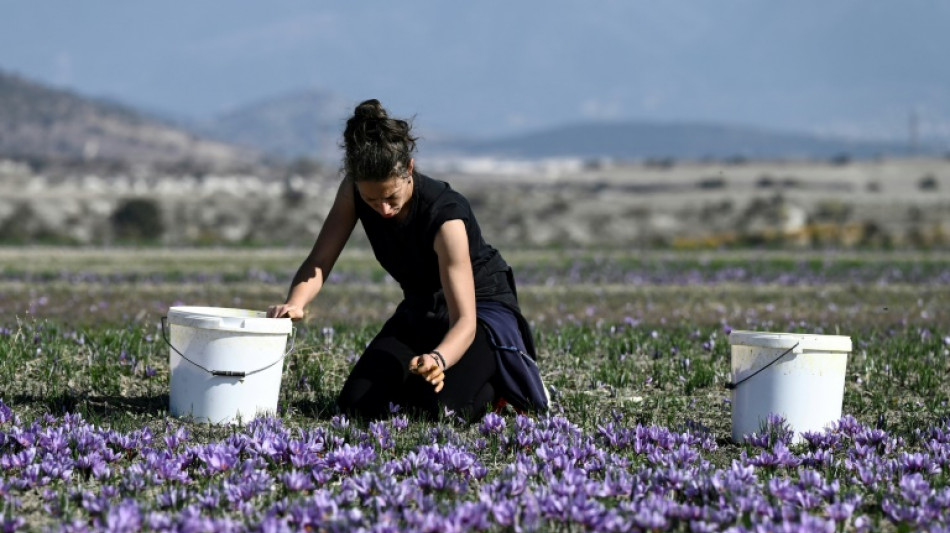
-
 Trump has options on Iran, but first must define goal
Trump has options on Iran, but first must define goal
-
Paris FC's Ikone stuns PSG to knock out former club from French Cup

-
 Australia's ambassador to US leaving post, marked by Trump rift
Australia's ambassador to US leaving post, marked by Trump rift
-
Slot angered by 'weird' Szoboszlai error in Liverpool FA Cup win

-
 Szoboszlai plays hero and villain in Liverpool's FA Cup win
Szoboszlai plays hero and villain in Liverpool's FA Cup win
-
Hawaii's Kilauea volcano puts on spectacular lava display
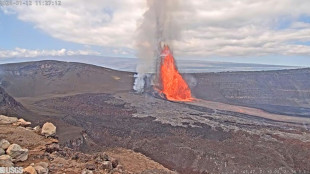
-
 US stocks at records despite early losses on Fed independence angst
US stocks at records despite early losses on Fed independence angst
-
Koepka rejoins PGA Tour under new rules for LIV players

-
 Ex-France, Liverpool defender Sakho announces retirement
Ex-France, Liverpool defender Sakho announces retirement
-
Jerome Powell: The careful Fed chair standing firm against Trump

-
 France scrum-half Le Garrec likely to miss start of Six Nations
France scrum-half Le Garrec likely to miss start of Six Nations
-
AI helps fuel new era of medical self-testing

-
 Leaders of Japan and South Korea meet as China flexes muscles
Leaders of Japan and South Korea meet as China flexes muscles
-
Trump sets meeting with Venezuelan opposition leader, Caracas under pressure

-
 Australia captain Alyssa Healy to retire from cricket
Australia captain Alyssa Healy to retire from cricket
-
US 'screwed' if Supreme Court rules against tariffs: Trump

-
 NATO, Greenland vow to boost Arctic security after Trump threats
NATO, Greenland vow to boost Arctic security after Trump threats
-
Israel to take part in first Eurovision semi-final on May 12

-
 How Alonso's dream Real Madrid return crumbled so quickly
How Alonso's dream Real Madrid return crumbled so quickly
-
Ex-Fed chiefs, lawmakers slam US probe into Jerome Powell

-
 Former Panama leader on trial over mega Latin America corruption scandal
Former Panama leader on trial over mega Latin America corruption scandal
-
Trump keeping Iran air strikes on the table: White House

-
 Paramount sues in hostile bid to buy Warner Bros Discover
Paramount sues in hostile bid to buy Warner Bros Discover
-
Ugandan opposition leader Bobi Wine warns of protests if polls rigged

-
 Airbus delivers more planes in 2025
Airbus delivers more planes in 2025
-
Alonso leaves Real Madrid, Arbeloa appointed as coach

-
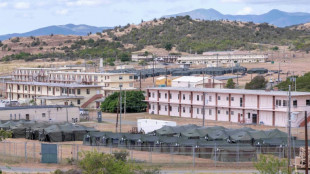 UK pays 'substantial' compensation to Guantanamo inmate: lawyer
UK pays 'substantial' compensation to Guantanamo inmate: lawyer
-
Iran protest toll mounts as government stages mass rallies

-
 Gold hits record high, dollar slides as US targets Fed
Gold hits record high, dollar slides as US targets Fed
-
Cuba denies being in talks with Trump on potential deal

-
 Scientists reveal what drives homosexual behaviour in primates
Scientists reveal what drives homosexual behaviour in primates
-
Venezuela releases more political prisoners as pressure builds

-
 15,000 NY nurses stage largest-ever strike over conditions
15,000 NY nurses stage largest-ever strike over conditions
-
Rosenior plots long Chelsea stay as Arsenal loom

-
 Zuckerberg names banker, ex-Trump advisor as Meta president
Zuckerberg names banker, ex-Trump advisor as Meta president
-
Reza Pahlavi: Iran's ex-crown prince dreaming of homecoming

-
 Venezuela releases more political prisoners
Venezuela releases more political prisoners
-
Kenya's NY marathon champ Albert Korir gets drug suspension

-
 US prosecutors open probe of Fed chief, escalating Trump-Powell clash
US prosecutors open probe of Fed chief, escalating Trump-Powell clash
-
Russian captain in fiery North Sea crash faces UK trial

-
 Carrick is frontrunner for interim Man Utd job: reports
Carrick is frontrunner for interim Man Utd job: reports
-
Iran government stages mass rallies as alarm grows over protest toll

-
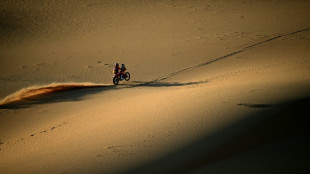 Variawa leads South African charge over Dakar dunes
Variawa leads South African charge over Dakar dunes
-
Swiss inferno bar owner detained for three months

-
 Heathrow airport sees record high annual passenger numbers
Heathrow airport sees record high annual passenger numbers
-
Georgia jails ex-PM for five years amid ruling party oustings
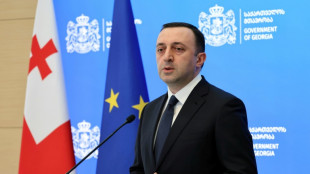
-
 Kyiv buries medic killed in Russian drone strike
Kyiv buries medic killed in Russian drone strike
-
Israel revokes French researcher's travel permit

-
 India and Germany seek to boost defence industry ties
India and Germany seek to boost defence industry ties
-
French coach and football pundit Rolland Courbis dies at 72


Cracked earth in Greece's saffron heartland as drought takes toll
At a field outside Kozani, northern Greece, the strikingly blue-and-purple petals of saffron give off an intoxicating scent that underscores the value of one of the country's most lucrative crops.
But beneath the beautiful flowers, which can fetch five to nine euros ($5.45-9.8) for a single gramme, the earth is cracked and parched after uncommonly long periods of drought, taking a toll on the crop's yield.
"We haven't had a good dose of rain in our area since May," sighed veteran saffron farmer Grigoris Tzidimopoulos.
After the warmest winter and summer since detailed records began in 1960, Greece has now experienced its driest month of October in the last 15 years, according to the national observatory.
"This field used to give us more than a pound (454 grammes) per acre. Last year... from nine acres in all, the yield was three pounds," 68-year-old Tzidimopoulos said.
"Ten or 12 years ago when I sowed, it often snowed. Now we have neither snow nor rain," he added.
- Ancient tradition -
Harvested in Greece for at least 3,600 years -- a saffron picker is even immortalised in a Minoan-era fresco -- the spice is commonly used to flavour rice, chicken and fish but can also be found in cosmetics and pharmaceuticals.
At the local village of Krokos and in about 20 other neighbouring villages in Kozani, the inhabitants have systematically cultivated saffron since the 17th century.
Around 1,000 farmers live from the crop in the area and are intimately familiar with the microclimate that the plant requires order to perform better.
About 5,200 hectares of land (12,800 acres) cultivated here produce the largest quantity of saffron in Europe.
The local Krokos Kozani variety, also known as Greek saffron, enjoys protected designation status at European Union level.
Seventy percent of the product is exported to over 20 countries, with the largest markets being Switzerland and the United States.
And the regional cooperative, set up in 1971, has the exclusive right to collect, package and distribute the product.
Sissy Ioana, 40, has been working the fields for over 10 years and knows from experience whether the upcoming harvest will be a good one.
"Every year the crop is worse," she said, holding up a freshly cut flower to show the red or orange threads that, once dried, make saffron.
- Thinner than hair -
"The flower is not very big. Other years it's three times as big. When you dry it out it will be thinner than hair," she told AFP.
According to local growers, it takes about 50,000 of these red specks to produce 100 grammes of Greek saffron.
The cultivation is particularly labour-intensive as the harvesting to packaging process is all done by hand.
In the 1980s, according to the cooperative, total saffron production in the area was as high as 12 tonnes. Last year it was just over one tonne.
"The annual quantities produced have been decreasing every year," said the cooperative's president, Vassilis Mitsiopoulos.
In 2017, the cooperative produced of 3.8 tonnes of saffron, while last year they barely reached 1.1 tonnes with the same acreage, he said.
"The climate is getting warmer. The rains are erratic through the year and at the wrong time. Snowfall is, I would say, non-existent now."
"All this has resulted in a reduced yield of Kozani saffron," he said.
Climate conditions have changed so dramatically over the last 20 years that olive trees now flourish in Kozani, something unthinkable previously, Mitsiopoulos said.
"If the (saffron) yield continues to be so low I imagine that producers will abandon it or be forced to try to relocate to more northern areas," he said.
R.Shaban--SF-PST



